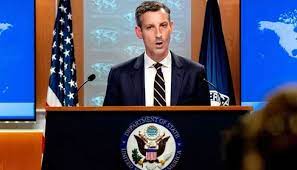US determined to work with Pakistan to combat terror threat in region: State Dept

Washington: Amid increasing cross-border attacks against Pakistan, the United States plans to work with Islamabad to deal with the threat of terrorism in the region, especially from Tehrik-i-Taliban Pakistan (TTP), a State Department spokesperson said Wednesday.
“It is, of course, our broader goal to see to it that terrorists and others aren’t able to use Afghanistan as a launch pad for attacks on Pakistan,” the department’s Spokesperson Ned Price said in response to a question about the rise of violence and the regrouping of terrorists in Afghanistan.
The Taliban, he said, was either unable or unwilling to live up to the commitments that they’ve made in a number of areas, especially on counterterrorism.
However, the US have capabilities when it comes to counterterrorism in the region that does not leave them entirely beholden to the Taliban, Price added.
“We demonstrated those capabilities in recent months with the killing of the now-deceased al-Qaeda emir, Ayman al-Zawahiri, making good on the pledge that you have consistently heard from President (Joe) Biden since the withdrawal of military forces from Afghanistan last year, that we will take action if we see international terrorists regrouping in Afghanistan,” the spokesperson said, adding, “We will take action in a way that protects our interests.”
“We are determined to work with our partners in the region, including Pakistan, to do what we can to take on the threat of terrorism in the region, and certainly the threat of terrorism that extends well beyond the region,” Price added.
Pakistan, the spokesperson emphasized, is an important partner in a number of respects.
“We value that bilateral relationship. We welcome opportunities to expand cooperation in areas that are of mutual interest to us and to Pakistan. That, of course, does include when it comes to counterterrorism.”
He pointed out that Pakistan receives grant assistance from the International Military Education and Training programme that provides professional military education, and operational and technical courses, thus strengthening the country’s own abilities to take on the threats – whether it’s counterinsurgency, counterterrorism – as well as skills courses that improve institutional capacity and resource management.
“The programme continues to enhance the bilateral relationship. It continues to strengthen military cooperation between our two countries,” Price added.





